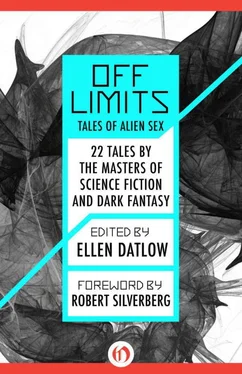Bach, Beethoven, and Brahms: her names for them, her three assailants, masters and dumb slaves as she herself was a slave. Dumb and sullen, beneath or beyond language, but she had to try to assign some meaning to the situation, had given them names to suit what she took to be their personalities in that time before this time when she must have come here, must have had reasons—what were they?—to enter this strange and damaged cloister, this space beyond redemption, to emerge as if from death or fever into the circling stare of the bears: eyes dull and compliant, slow struggle of limbs as they balanced on hind legs, ready to begin the dance anew; and she their silent partner, pink and breathing on the wood.
There was no real communication amongst them; they seemed to her to work within circumscription, intersecting only to bump as one left, another came to snort and root around her stricken body. She had known from the first that appeals, cries, struggles, resistance of any kind would only have attenuated her situation; the animals were beyond command, beyond whatever powers of humanity she had then been still able to summon and so: the splinters: the fur: the paws and the breathy stink. Her agony. Their arabesques. Submitting to them, over and over, submitting to Bach now, the largest of them and the most regular, the most rhythmic, the most metronomic: Bach because this B seemed to believe in order, in a kind of regulation of movement which rattled and thrust in clearly identifiable rhythms, rhythms as solid and inescapable as Bach, Beethoven, and Brahms, as the distorted perspective of this floor, this light, this distance inside and out.
Now Bach yawed and steamed against her, the smell of the beast in her head, on her lips like some dry unguent, his huge body seeking, seeking, humped and breathing, gigue and largo and then subsiding, guiding himself away from her, the turgid genitals of the metronomic bear refracted in the shadows, those shadows already diminishing as Bach moved slowly from her in an odd, abbreviated limp, humping his way into the darkness. The shadows seemed lifeless even in motion, even as she seemed lifeless there on the wood of the floor.
In this silence, in this momentary partition, she thought she might be spared for a while, that Bach had now had his ceremonial fill and that Beethoven and Brahms were in the upper room, casting circles of darkness, silent beyond bearish grunts and small explosions of fathomless feeling, but even as she turned in this moment’s relief, moved to gather the ragged blankets, to press that sleeve of insubstantial protection against herself, she felt them eased from her grasp and then Brahms, a huge, sordid mass was settling himself against her. Brahms: the autumnal bear, the bear of sneezes and sighs and small, absent groans, passion expended, fallen desire and she, too, groaned with the futility, the hopelessness of the bear’s attributed despair as on her stomach he cast circles with a paw, then clumsy in wintry desire straddled her at last. Sinking slightly beneath the bear, resigned to assist as much as possible; unlike the others Brahms seemed to her to appreciate some kind of gesture, to have a sense of her presence and collaboration whereas the others, so locked into their own spasms and black rhythms, gave no sense of recognition or response at all. Snorts, sighs, the press of fur against her as she raised her hands, grasped the bear to draw him to a kind of crooning concentration as deep underneath the fur the small shudders, foreshadowed expenditure and then the bear’s yelp, a human sound, a high, girlish shriek as he rolled away from her to lie, streaked by light, a wheezing heap: damp fur, sweat, soot, and for her again that dim shudder within her thighs, sensibility risen and draining from her just as she had drained from this house that which she had found before her.
She must have found something before her, must have been outside this house at one time, brought into it by accident of desire or curiosity now denied recollection: there was a past beyond and before this house, that smell, those shudders creeping like insects up and down her helpless legs, thighs, spread and spraddled, and she would have wept, great groaning tears against the wood, wood pressed to her lips, splinters like the wafer of God himself between her teeth, but here there was if not godlessness then the orbit of no salvation, here was the constellation, the great cross of heat, sour stink, black upon black upon fur upon flesh; nothing and everything, here in this room. Reeking, aseptic cavern, drawn and enthralled and diminished like the vessel that drains but is not emptied, there must have been something prior to this but it was closed to her now, closed forever like the doors of nascence, slammed like the gates of death on the yearning faces of the living: there is no going forward nor back, there is nothing. This is what is: this floor, these animals, the faint metallic scent of her own fluid, her body pinned in rags and speckled with old blood; and the door; and the light.
Brahms sobbed in a corner, again she reached for the blankets but the great sounds of imminence flooded the room and she knew before the collision that Beethoven,, the most jolting and demoniac of the three, had come to seek in her his own fulfillment; Beethoven of the sudden, shuddering strokes, the silences, the storms, the great uneven swings of the body: the one she feared most in those broken unleashings of spine and heat grabbing her, grabbing her, the alternating cycles of some unknowable need seizing the hammer and tongs of the bear’s body as it rammed against her and this, now, was the present, the animal against her, great in its need but curiously empty and tentative for all that; at the core the same uncertainty and brokenheartedness of Brahms but the shell was hard, hard, and she felt Beethoven pass through, over, above her like a storm, his hoarse grunts of emission, and she thought, eyes closed, no more, no more as she sank beneath fur, paws, breath, spasm, eaves, and darkness of the house collapsing around her and all around the darkening trot of the beasts as at some time later or perhaps this was earlier—smashed chronology, chronology smashed—they gathered to confer.
It was the feast she remembered, if memory gave her any gifts at all: some telescoping of circumstance found her seated high in the room, a table of fruits and desserts before her, all of the spices and jellied treats and cakes smeared lascivious with icing spread on a table the size of an altar, a table larger than any she had ever seen and she leaned toward that feast, thinking I want this, the food enormous in her hand, her hand spreading to encompass the feast entire: and in the moment before enjoyment, before even its possibility she heard them: there at the far side of the room, their small, luminescent eyes fixed upon her, the shaggy blackness of their fur not harbinger but frankest truth: and the seizure of breath, the cakes toppled, the fruit rolling and smashing as she rolled and smashed, pulped and tore, juices everywhere as in that new posture of dreadful and fixed attention they came, one by one, upon her, for the first of an endlessness of times.
Reaching for Brahms’ tail as he rooted and muttered around her, lifting herself to some less strenuous accommodation, she felt that she in some way was sinking toward some kind of new, ursine splendor, had somehow—by pain, by terror, by the pink pity of her ravaged limbs—dissolved the barrier between herself and the beast atop her. Picking and poking at the secret heart of the great animal she found herself served as well as serving, become more than sheer receptacle: it was a kind of way out, perhaps: it was the method of escape that sinks one more fully into the pit, and as the bear commenced its familiar, groaning adumbration of expenditure she shouted something, hoarse and guttural, caw like the bark of an animal, something before language which was itself language and gripping that fur tried to come up with Brahms even in the bear’s descent: and the long, pivoting drop which in its suspension and calamitous nature seemed in some way to mimic her confused ideas of escape, to be escape: go farther in: become: belong. Sunk into slivers, vaulted into light, she felt herself as one with Brahms even as the seizure squirted to the expected silence and the bear shambled away as if she did not exist at all.
Читать дальше












